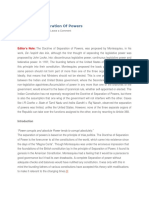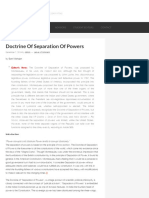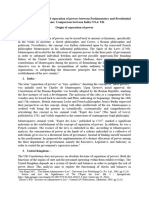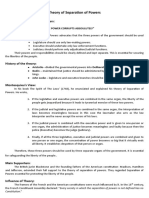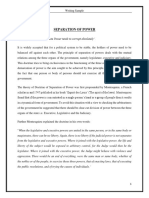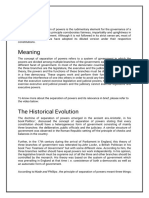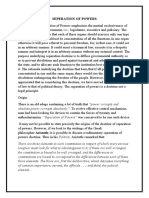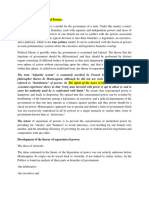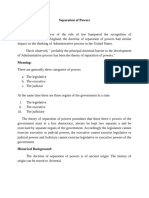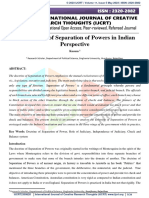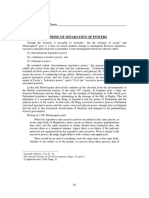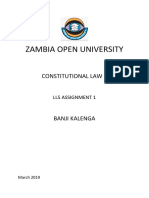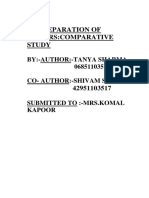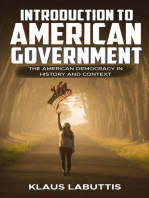Separation of Powers: Montesquieu in His Book "Spirit of Laws, 1748", Before Him John Locke Had Also Talked About
Separation of Powers: Montesquieu in His Book "Spirit of Laws, 1748", Before Him John Locke Had Also Talked About
Uploaded by
VaibhavCopyright:
Available Formats
Separation of Powers: Montesquieu in His Book "Spirit of Laws, 1748", Before Him John Locke Had Also Talked About
Separation of Powers: Montesquieu in His Book "Spirit of Laws, 1748", Before Him John Locke Had Also Talked About
Uploaded by
VaibhavOriginal Title
Copyright
Available Formats
Share this document
Did you find this document useful?
Is this content inappropriate?
Copyright:
Available Formats
Separation of Powers: Montesquieu in His Book "Spirit of Laws, 1748", Before Him John Locke Had Also Talked About
Separation of Powers: Montesquieu in His Book "Spirit of Laws, 1748", Before Him John Locke Had Also Talked About
Uploaded by
VaibhavCopyright:
Available Formats
Separation of Powers
It is a doctrine of Constitutional Law under which the three branches of the government, I.e.,
the Executive, Legislature and Judiciary are kept separate from each other. It is one of the
parts of constitutionalism that helps in maintaining the checks and balance as each branch is
given separate power as to check and balance the other. The boundaries are demarcated and
generally each branch is not allowed to exercise the power of the other.
This helps in curtailing the arbitrary use of powers by the government, and helps in unfolding the
objective of constitutionalism.
The first modern formulation of this doctrine was given by the French Philosopher,
Montesquieu in his book “Spirit of Laws, 1748”, before him John Locke had also talked about
the same about dividing the legislative powers between the King and the parliament.
According to Montesquieu, liberty is most effectively safeguarded by the separation of power.
This was widely observed, and as a result it was incorporated in the US Constitution in its first 3
articles giving the Legislative powers to Congress, Executive to President and the Judicial
powers to the US Supreme Court. And, the same has also been followed in India as Article 121
states that No discussion shall take place in Parliament with respect to the conduct of any Judge
of the Supreme Court or of a High Court in the discharge of his duties except upon a motion for
presenting an address to the President praying for the removal of the Judge as hereinafter
provided. Similar provisions are there regarding state legislatures.
In India, because of Parliamentary system of government, there is no strict separation of Power.
As administration is always marred by politics as the ministers involved are part of both the
executive and legislative. On the other hand, in UK it’s more or less like India only.
You might also like
- Separation of POwers in Malaysia, UK and USADocument38 pagesSeparation of POwers in Malaysia, UK and USAshahdhuan100% (1)
- Builder Association of India V Cement Manufacturers AssociationDocument7 pagesBuilder Association of India V Cement Manufacturers AssociationVaibhav67% (3)
- Doctrine of Separation of Powers IvDocument9 pagesDoctrine of Separation of Powers IvSubh AshishNo ratings yet
- Comparative Law PrachiDocument12 pagesComparative Law PrachiPRAWARTIKA SINGHNo ratings yet
- BE AddDocument47 pagesBE AddAnuj ShroffNo ratings yet
- Doctrine of Separation of PowersDocument12 pagesDoctrine of Separation of PowersManu GuptaNo ratings yet
- Separation of PowersDocument52 pagesSeparation of Powersfoujiarahaman2004No ratings yet
- Separation of Power in India: International Journal of Academic Research and DevelopmentDocument3 pagesSeparation of Power in India: International Journal of Academic Research and Developmentnishantarya283No ratings yet
- Separation of PowersDocument12 pagesSeparation of PowersHarshpreet KaurNo ratings yet
- Separation of Powers and Its RelevanceDocument10 pagesSeparation of Powers and Its RelevancePalakNo ratings yet
- Montesquieu Seperation of PowerDocument19 pagesMontesquieu Seperation of PowerMadessa's channelNo ratings yet
- A Comparative Analysis of Separation of Powers Between Parliamentary and Presidential SystemsDocument7 pagesA Comparative Analysis of Separation of Powers Between Parliamentary and Presidential Systemssudha gargNo ratings yet
- Montesquieu's Theory of Separation of PowersDocument5 pagesMontesquieu's Theory of Separation of PowersRewant Mehra100% (1)
- Political Science 2Document21 pagesPolitical Science 2manikanta kumarNo ratings yet
- COI 12Document13 pagesCOI 12Harry PotterNo ratings yet
- Separation of PowersDocument15 pagesSeparation of PowersYusuph kiswagerNo ratings yet
- Writing SampleDocument9 pagesWriting SampleDeepanshu ShakargayeNo ratings yet
- Explain the doctrine of administrativeDocument16 pagesExplain the doctrine of administrativeVARUNKUMAR KlNo ratings yet
- Principle of Seperation of PowerDocument6 pagesPrinciple of Seperation of PowerArishti SinghNo ratings yet
- Separation of Power in IndiaDocument12 pagesSeparation of Power in IndiaShivam PatelNo ratings yet
- Separation of Powers in UKDocument12 pagesSeparation of Powers in UKYuvanshiNo ratings yet
- Week 3 Assignment Admin LawDocument10 pagesWeek 3 Assignment Admin LawGuntalk CityNo ratings yet
- Knowledge Area 2Document24 pagesKnowledge Area 2HassaniNo ratings yet
- Principle of Separation of Powers AND Concentration of Authority Tej Bahadur SinghDocument11 pagesPrinciple of Separation of Powers AND Concentration of Authority Tej Bahadur SinghgowthamNo ratings yet
- Nalysis: N U S & R L, RDocument11 pagesNalysis: N U S & R L, RGarvit Vajpai KittuNo ratings yet
- Aristotle-Politics - BOOK 4 - Part XIVDocument6 pagesAristotle-Politics - BOOK 4 - Part XIVnaman guptaNo ratings yet
- Seperation of PowersDocument29 pagesSeperation of PowersKhan ZeenatNo ratings yet
- Seperation of powerDocument10 pagesSeperation of powernirmalmandal7074No ratings yet
- Separation of PowersDocument12 pagesSeparation of PowersArvind MohitNo ratings yet
- Separation of PowersDocument6 pagesSeparation of Powersasifukhan333No ratings yet
- Administration ProjectDocument11 pagesAdministration Projectgeetika singhNo ratings yet
- Separation of PowersDocument15 pagesSeparation of PowersItohan AbosedeNo ratings yet
- Admin Law AssignmentDocument16 pagesAdmin Law AssignmentNilotpal RaiNo ratings yet
- Separation of PowersDocument8 pagesSeparation of PowersPallab SinghaNo ratings yet
- Pol100 Midterm Topic 1Document9 pagesPol100 Midterm Topic 1Olivia AlmazanNo ratings yet
- SEPARATION OF POWERSDocument12 pagesSEPARATION OF POWERSSakshiNo ratings yet
- Separation of Power in UK AssignmentDocument2 pagesSeparation of Power in UK Assignmentsapuni NayananayakeNo ratings yet
- Seperation of PowersDocument17 pagesSeperation of PowersKamya Chandok100% (1)
- Theory of The Separation of PowersDocument10 pagesTheory of The Separation of Powersanirban65536No ratings yet
- Seperation of PowersDocument6 pagesSeperation of PowersGanesh BaligaNo ratings yet
- The Doctrine of Separation of Powers in Indian Perspective: KusumDocument9 pagesThe Doctrine of Separation of Powers in Indian Perspective: Kusumrashiamazing27No ratings yet
- Separation of Power ILSDocument11 pagesSeparation of Power ILSB.bharat KrishnaNo ratings yet
- Advance Constitutional Law (Exam)Document16 pagesAdvance Constitutional Law (Exam)Irfan MazharNo ratings yet
- Separation of Powers1 IV SemesterDocument7 pagesSeparation of Powers1 IV SemesterRuin RExNo ratings yet
- Atanda Principle of LawDocument15 pagesAtanda Principle of LawOladipo Olawale amosNo ratings yet
- Montesquieu in The Following Words Stated The Doctrine of Separation of PowersDocument6 pagesMontesquieu in The Following Words Stated The Doctrine of Separation of PowersTeesta AgarwalNo ratings yet
- Separationof Powers AComparative Study Under Bangladesh India UKand USAConstitutionDocument102 pagesSeparationof Powers AComparative Study Under Bangladesh India UKand USAConstitutionjaforiqbal288No ratings yet
- doctrine of separation of powersDocument11 pagesdoctrine of separation of powerspradyumnakumar2803No ratings yet
- Doctrine of Separation of PowersDocument10 pagesDoctrine of Separation of PowersBanji KalengaNo ratings yet
- Adminstrative LawDocument9 pagesAdminstrative LawAmit PangamNo ratings yet
- Separation of PowersDocument8 pagesSeparation of PowersNeenu Anna NinanNo ratings yet
- The Separation of Power and Check and Balance - 1Document2 pagesThe Separation of Power and Check and Balance - 1Amir HameedNo ratings yet
- 1805-Article Text-3565-1-10-20201205Document7 pages1805-Article Text-3565-1-10-20201205SHIVANSH GUPTANo ratings yet
- Pol Seperation of PowersDocument10 pagesPol Seperation of PowersSwatantraPandeyNo ratings yet
- Blog Ipleaders in Separation of Powers and Its RelevanceDocument10 pagesBlog Ipleaders in Separation of Powers and Its RelevanceSneha prakashNo ratings yet
- The Separation of Powers:Comparative Study: By:-Author:-Tanya Sharma 06851103517 Co-Author:-Shivam SethiDocument16 pagesThe Separation of Powers:Comparative Study: By:-Author:-Tanya Sharma 06851103517 Co-Author:-Shivam Sethishrishti sharmaNo ratings yet
- Theory of Separation of Powers: Assignment OnDocument9 pagesTheory of Separation of Powers: Assignment OnMd FahimNo ratings yet
- Introduction To American Government: The American Democracy In History And ContextFrom EverandIntroduction To American Government: The American Democracy In History And ContextNo ratings yet
- Judicial Fortitude: The Last Chance to Rein In the Administrative StateFrom EverandJudicial Fortitude: The Last Chance to Rein In the Administrative StateNo ratings yet
- Summary: The Constitution in Exile: Review and Analysis of Andrew P. Napolitano's BookFrom EverandSummary: The Constitution in Exile: Review and Analysis of Andrew P. Napolitano's BookRating: 5 out of 5 stars5/5 (1)
- Project List: Legal Reasoning and Skills Division B, B.B.A LL.B, Batch 2071-22 S.No Name PRN Project B.B.A LL.B Signature 1. 2. 3. 4Document4 pagesProject List: Legal Reasoning and Skills Division B, B.B.A LL.B, Batch 2071-22 S.No Name PRN Project B.B.A LL.B Signature 1. 2. 3. 4VaibhavNo ratings yet
- Am 10Document2 pagesAm 10VaibhavNo ratings yet
- Promoters Liability Under Companies ActDocument13 pagesPromoters Liability Under Companies ActVaibhavNo ratings yet
- AM 4, Mausam KumarDocument1 pageAM 4, Mausam KumarVaibhavNo ratings yet
- Labour and Industrial Law Child Domestic LabourDocument9 pagesLabour and Industrial Law Child Domestic LabourVaibhavNo ratings yet
- Environmet Risk and TortsDocument13 pagesEnvironmet Risk and TortsVaibhav100% (1)
- Aristotle and Virtue TheoriesDocument12 pagesAristotle and Virtue TheoriesVaibhavNo ratings yet
- Maintenance in Muslim LawDocument12 pagesMaintenance in Muslim LawVaibhavNo ratings yet




